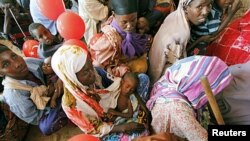The eastern Horn of Africa is experiencing the worst drought in the past 60 years, and the resulting famine is considered to be the worst in a generation. Somalia has been the hardest hit. But food shortages are being experienced in neighboring countries as well, with some 12.4 million people across the Horn of Africa having been affected by the food crisis.
But the bad news is that the situation will get worse before it gets better, according to a report issued on August 24 by the Famine Early Warning Systems Network, or FEWS NET, the lead organization in the field of prediction and response to famines. Fews Net is funded by the United States Agency for International Development, or USAID.
In southern Somalia, Fews Net says that two consecutive failed harvests have resulted in sky-rocketing grain prices. The most recent harvest, the Gu, is the lowest in the last 17 years.
But even if next January’s harvest is normal, poor households in southern Somalia still face four months of massive food shortages until they will benefit from these crops.
As it is, the people of the Horn of Africa must depend on help from abroad. Some $2.5 billion will be needed to address the humanitarian crisis. So far, donors have pledged about $1 billion. In late August, the nations of the African Union committed to another $350 million. It was the first time the African Union had organized its members for this type of appeal.
The United States is providing more than $600 million in aid that is helping more than 4.6 million people suffering from drought and famine in the Horn of Africa. But we know that emergency assistance alone cannot solve underlying long-term problems, so the U.S. is providing longer term development assistance through Feed the Future, a program initiated by the Obama Administration, which aspires to create greater food security in the region with better agricultural skills, techniques and infrastructure development.
"We must remember that time is not on our side," said Secretary of State Hillary Clinton. "Every minute, more people, mostly women and mostly children, are dying. They’re becoming sick. They are fleeing their homes. We must respond. We need to rise to the level of this emergency by acting smarter and faster than we have before to achieve both short-term relief and long-term progress."
Somalia Famine Expected To Worsen

The eastern Horn of Africa is experiencing the worst drought in the past 60 years, and it is expected to worsen.
















